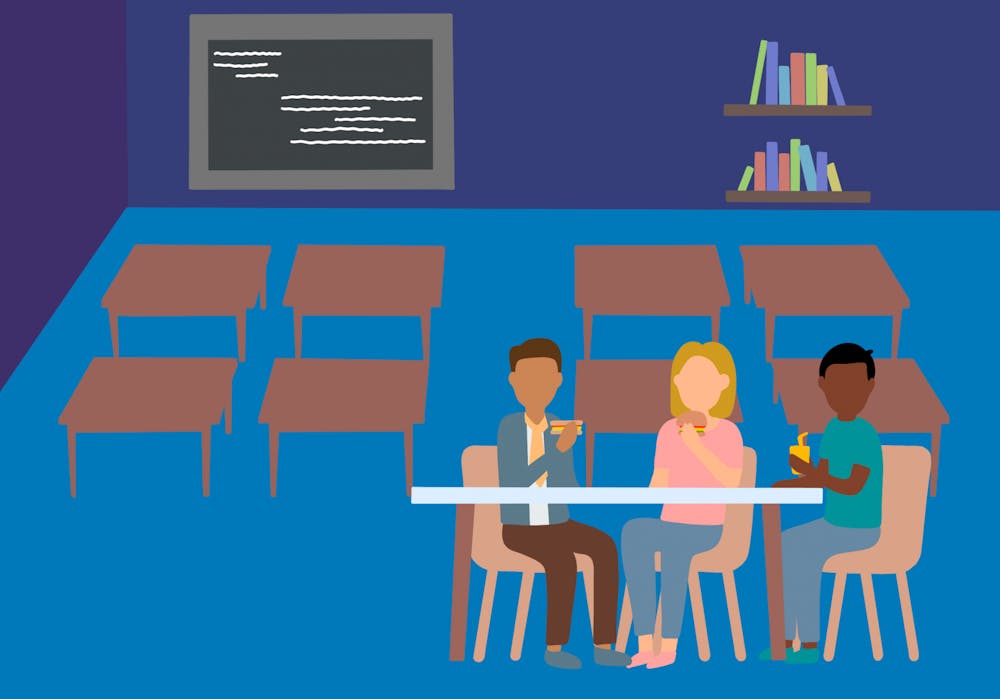Through attending office-hours and sharing an occasional meal, students and professors both attempt to build relations with one another in order to build a more cohesive learning experience at the University. Students look to gain everything from a better understanding of the material to tangible, experienced-based career advice, while professors find enjoyment in and even learn from getting to know their students.
Before the COVID-19 pandemic, chatting with professors after class represented an opportunity to gain a greater understanding of class concepts and get to know instructors for third-year Engineering student Patrick Dunnington.
“Besides office hours, often I would go and talk to them after class about a question I had, because sometimes in the middle of class it's hard to pause a lecture,” Dunnington said.
The lack of in-person interactions during the peak of the pandemic enabled students to realize the value of physically being in the classroom with their peers and professors. Once the pandemic passed, students were more likely to take advantage of being able to speak with their instructors in person.
“I think immediately after COVID, it was more like, ‘Oh, I have access to my professors, I haven't had that in a while’ — and so it was exciting,” Dunnington said.
Even younger students understood the positive effect of in-person learning on attempting to cultivate relationships with their professors. First-year Engineering student Reevu Adakroy felt lucky to have his first year at the University be in-person and recognized the value of getting to know his professors.
“They're really good resources ... as people who dedicate themselves to helping their students and also knowing so much about their fields would be a wasted opportunity not to get to know them better,” Adakroy said.
Dunnington noted how his initiative to engage with professors has prompted discussion on his own career trajectory, summer internship and research projects. He has found that striking up conversations about class leads to more productive discussions about the bigger picture in his life.
“We’ll end up going off of the topics discussed in class, and then especially in engineering, to a more general, ‘Oh, this is what you want to do in a job’, or ‘This is a problem I solved recently’, which is cool to hear about,” Dunnington said.
Despite the potential value for students in getting to better know their professors, these relationships have always been tough to facilitate from the faculty’s perspective — and not just as a result of the COVID-19 pandemic. Visiting Economics Prof. Edwin Burton has struggled to engage with his students informally, before and after the pandemic.
Burton noted how eating lunch with faculty was common practice during his time as an undergraduate at Rice University. This experience is what inspired his own habit of taking students to lunch.
“When I was an undergraduate at Rice, there were 1,200 students,” Burton said. “Every day we all ate lunch together, the faculty and the student body. You were very likely to sit down next to a professor of classics, or one in biology.”
Now at the University, Burton hopes to provide his students with a similar experience that he enjoyed during his undergraduate years. He invites them to lunch throughout the week to break the ice and get to know one another.
“Students are always reluctant to go to lunch with their professors, but I push them every day,” Burton said. “Every class I say, ‘Okay, who wants to go to lunch tomorrow at noon?’ I send them emails, and I just keep barraging them all semester and so finally, some of them that have never gone say, ‘Well, why not? Everybody has to eat, right?’”
Adopting this “why not” attitude has helped many students develop a relationship with Burton that extends beyond their time at the University. Burton hopes to cultivate their learning and interest in his particular field of study of finance and beyond. However, Burton is quick to point out that students are not the only ones reaping the benefits of going to lunch with him, as he still learns from his students as well.
“Other professors may think, ‘I don’t really want to go to lunch with a student.’ Well, do it a few times and see,” Burton said. “You might be surprised how enjoyable it is and how much you learn from students … they may not know the subject you’re teaching very well, but they know things we don’t know.”
For Burton, connecting with students informally is the most effective way to fulfill his role as a professor and make an impact on not just students’ understanding of class material or research, but on their careers and lives. Over his 34-year career, Burton has taken more than hundreds of students for a meal in efforts to connect with them and get to know them.
Adakroy, in addition to serving as a teaching assistant and conducting research in applied mechanics, describes how he appreciates even the most simple interactions with his professors such as staying after class and just having a chat.
“It’s just really interesting to discuss topics, try to understand things better and really just take advantage of the opportunity that there’s someone who knows so much and is willing to put in so much time,” Adakroy said.
For students who haven’t tried as much to connect with their professors, Adakroy offered a piece of advice to get started.
“Choose a class that you really care about, think of an interesting question, and have one conversation with your professor,” Adakroy said. “It’ll help you with the material, and it’s an opportunity to know someone better, who might make your future better.”







